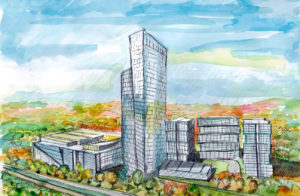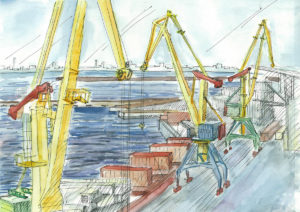
Last year in Kazakhstan the updated Code of Civil Procedure as of October 31, 2015 was adopted. It entered into force on January 1, 2016 (hereinafter "the updated Code of Civil Procedure").
One of the most important novels in the updated Code of Civil Procedure is to improve the stages of preparation of a case for trial through the expanded range of issues resolved at that stage.
In Section 2 of the updated Code of Civil Procedure, which regulates the proceedings in court of first instance, Chapter 16 is devoted to the preparation of a case for trial, being an essential stage of the civil procedure. It must be emphasized that in the consideration of a case in summary proceeding (writ proceedings, summary (written) proceedings) there is no such stage.
Preparation of a case for trial is a combination of procedural actions of the judge, the parties to the trial and other persons involved in the case, which have to be carried out within the time limits established by the law and are intended to ensure the timely and proper resolution of the case.
The objectives set to the process of preparing a civil case, as provided for in Part 2, Article 163 of the updated Code of Civil Procedure, remained the same: clarifying the circumstances that are important for the correct resolution of the case; determining the legal relations between the parties and the law, which the court should be guided by; the resolution of the issue as to the composition of the persons involved in the case, and their proper notification of the time and place of the hearing; determining the evidence that each party should submit in support of their claim or defense. Some other objectives set before the judge were added: to promote the reconciliation between the parties at the stage of preparing a case for trial, which in fact was practiced before, but now it is enshrined in the law as one of the objectives at the given stage of the civil procedure. By the way, to more actively promote reconciliation of the parties, the norm is set that the parties shall be paid back the state fee they paid when filing the claim in court.
The updated Code of Civil Procedure introduces an absolutely new way of reconciliation with the participation of advocates – the Participatory procedure – that provides the opportunity to the participants of the dispute to negotiate in the active participation of the advocates. We hope that the conducting of conciliation procedures as the pre-trial settlement of civil disputes and the participatory procedures of the advocates will add to reduce the number of lawsuits and claims which the parties are able to resolve through reconciliatory and participatory procedures.
The period of preparation of a case for trial increased from 7 working days from the date of filing the application up to 15 working days. If earlier, in exceptional cases, with regard to the cases of particular complexity the judge could extend the period of preparation of them to one month, now for such cases the period of preparation can be extended by an additional one month.
The updated Code of Civil Procedure more clearly defines actions of the judge and other participants to the proceedings after registering the statement of claim by the court (Article 165). In addition, the more stringent requirements are now set to the procedure of provision of evidence in the course of preparation of the case for trial in the Court of First Instance (Article 73).
Thus, by virtue of Article 66 of the previous version Code of Civil Procedure, the parties to the trial and other persons involved in the case could provide evidence to the court of first instance, without any time limits set for the provision of such evidence. In practice, this led to the fact that in the past the parties produced evidence in time up to the judicial debate. Now, according to Part 1, Article 73 of the updated Code of Civil Procedure, the evidence shall be produced by the parties to the trial and other persons involved in the case, to the court of first instance at the stage of preparation of the case for trial. Failure to submit the evidence available to the parties to the court of first instance in time excludes the possibility of presenting evidence to the court of appeal and cassation.
The updated Code allows you to present evidence at the stage of the trial as well, providing only that the persons, who have produced the evidence, manage to justify their impossibility to produce the evidence at the stage of preparation for the trial.
In this regard, in accordance with Article 165 Item 4 of the updated Code of Civil Procedure, the court is implied with the duty to clarify to the parties the legal consequences of late submission of the evidence within the specified period set by the court and unreasonable delays in the process.
Also, it should be noted that in such cases, as provided for in Part 2, Article 404 of the updated Code of Civil Procedure, the evidence may be also presented to the court of appeal together with the justification in the relevant complaint of impossibility to produce the evidence to the court of first instance, including the situation when the person has not been summoned to court to participate in the proceedings of the court of first instance, or if at the court of first instance the motion was filed to scrutinize such evidence, or to order the disclosure of evidence, but these were rejected.
One more novel should be noted. The previous practice was that the judge, having recognized the case as one ready for the trial, issued a ruling to start the proceedings in the court and notified the parties to the trial and other participants of the proceeding of the time and place of the hearing. The new practice is that in accordance with Part 1, Article 172 of the updated Code of Civil Procedure, the preliminary hearing is held, based on the results of preparation of the case for trial. So, at the stage of preparation of the case for trial, now there is a separate hearing with recording the protocol, which aims to secure the procedural actions with regard to the parties to the trial and other persons involved in the case, performed in the preparation of the case for trial. The court during the preliminary hearing discuss the circumstances of the case with the parties, asks questions; the parties to the trial and other persons involved in the case, who are present at the proceeding, have to be heard. Moreover, at the preliminary hearing the judge can examine the facts of missing the time limit for recourse to the court or the period of time specified in a statute of limitations. If the period of time specified in a statute of limitations or the time limit for recourse to the court is missed without reasonable justification, the judge takes a decision to dismiss the claim without examining other factual circumstances of the case (Part 6, Article 172). In case the court decides to acknowledge the claim, the judge makes a decision to sustain the claim without examining the circumstances of the case. If there is no need for additional proceedings or examination of evidence, the court decides on the merits of the stated claim (Part 7, Article 172).
It should also be noted that under the updated Code of Civil Procedure, the plaintiff has the right to change the ground or subject of the claim, or to increase or decrease the amount of the claim by filing a written application before the end of the preparation of the case for trial. It is also allowed to do so before the court retired into chambers, without the need for additional proceedings (Article 169). For comparison, earlier the change in the ground or subject of the claim, increase or decrease the amount of the claims was allowed up to the end of examination of the case on its merits.
Regarding the counterclaim which the defendant is entitled to present to the plaintiff for joint consideration with the original claim, now the counterclaim may be brought before the completion of preparation of the case for trial. The counterclaim may be upheld during the trial, but only if the defendant was not involved at the stage of preparing the case for trial on the ground of improper notification of the time and place of preparation of the case for trial (Article 153).
The parties to the trial and other persons participating in the case shall be notified of the time and place of the preliminary hearing. The failure of any of the persons summoned to appear in court shall not be an obstacle to holding the preliminary hearing.
The above-said evidences that if earlier in practice the independence of preparation of a case for trial as a stage of civil procedure was often questioned, and the participants to the trial and the judges sometimes treated that stage very formal, since the preparation for the case out of the trial didn’t matter, now the situation has cardinally changed, as we can see.
It is no coincidence that the other stage of civil procedure – proceedings in the court of appeal – which powers were extended by the Code of Civil Procedure in effect, includes a mandatory stage of preparation of a civil case for trial. Article 414 of the updated Code of Civil Procedure regulates the procedure for the preparation of a case for trial and imposes an obligation on the court of appeal to carry out actions, as provided for in Article 165 of the Code of Civil Procedure, which the court of first instance is guided by, inter alia. In fairness, it should be noted that the analogous provision was in effect in the previous version of the Code of Civil Procedure (Article 348), and that fact that this provision has remained in effect in the updated Code of Civil Procedure underlines once again the importance of the stage of preparation of a case for trial.
Prepared by Gulnar Ospanova, Partner at Artyushenko & Partners law firm February 08, 2016
In Artyushenko & Partners online Store you can buy our fixed fee legal services:







